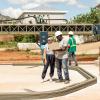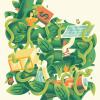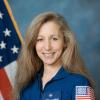Science & Technology
 Thinking Huts, founded by Maggie Grout, uses 3D printing technology to build sustainable schools in underserved communities.
Thinking Huts, founded by Maggie Grout, uses 3D printing technology to build sustainable schools in underserved communities. From engineered "living" sidewalks to quantum-fueled leak detection systems, several CU spinouts are bringing earth-focused breakthroughs to the marketplace.
From engineered "living" sidewalks to quantum-fueled leak detection systems, several CU spinouts are bringing earth-focused breakthroughs to the marketplace. Elizabeth Frank (PhDGeol’14) is helping pave the way for a new era of space exploration and commerce as the chief scientist at Interlune, a Seattle-based startup aiming to become the first private company to harvest the Moon’s natural resources.
Elizabeth Frank (PhDGeol’14) is helping pave the way for a new era of space exploration and commerce as the chief scientist at Interlune, a Seattle-based startup aiming to become the first private company to harvest the Moon’s natural resources. CU Boulder and Elevate Quantum partners are ready for $127M regional quantum boost. Here’s how it’s all coming together.
CU Boulder and Elevate Quantum partners are ready for $127M regional quantum boost. Here’s how it’s all coming together.- Tens of millions of years ago, ancient viruses infected our primate ancestors, leaving flecks of DNA that made their way into the human genome. A new study suggests these “endogenous retroviruses” may not be as harmless as once believed.
- Researchers at the ATLAS Institute at CU Boulder hope their DIY machine will help designers around the world experiment with making their own, sustainable fashion and other textiles from a range of natural ingredients—maybe even the chitin in crab shells or agar-agar from algae.
 CU’s Laboratory for Atmospheric and Space Physics (LASP) is the university’s first and highest-budget research institute. Here are just a few of the many missions LASP has helped propel forward.
CU’s Laboratory for Atmospheric and Space Physics (LASP) is the university’s first and highest-budget research institute. Here are just a few of the many missions LASP has helped propel forward. New kinds of padding could make football gear, bike helmets safer than ever.
New kinds of padding could make football gear, bike helmets safer than ever. Marsha Ivins (AeroEngr’73) is a retired astronaut who has participated in five missions to space. This year, she was selected as a 2024 inductee for the U.S. Astronaut Hall of Fame, one of the highest honors in the industry.
Marsha Ivins (AeroEngr’73) is a retired astronaut who has participated in five missions to space. This year, she was selected as a 2024 inductee for the U.S. Astronaut Hall of Fame, one of the highest honors in the industry. CU’s Leslie Leinwand helped develop the first drug for an incurable heart disease, sold two companies for billions and founded a thriving biotech institute. She’s just getting started.
CU’s Leslie Leinwand helped develop the first drug for an incurable heart disease, sold two companies for billions and founded a thriving biotech institute. She’s just getting started.

